2023届高三英语二轮复习定语从句课件-(30张PPT)
文档属性
| 名称 | 2023届高三英语二轮复习定语从句课件-(30张PPT) | 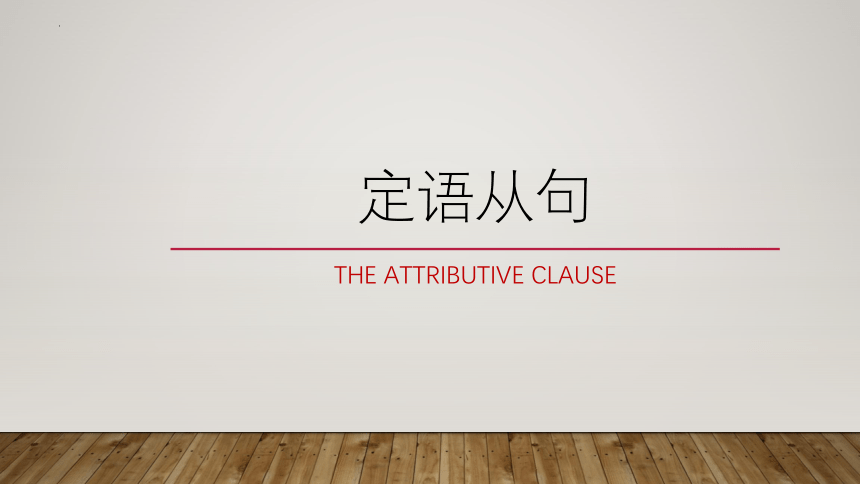 | |
| 格式 | zip | ||
| 文件大小 | 249.2KB | ||
| 资源类型 | 教案 | ||
| 版本资源 | 通用版 | ||
| 科目 | 英语 | ||
| 更新时间 | 2022-12-31 21:22:26 | ||
图片预览

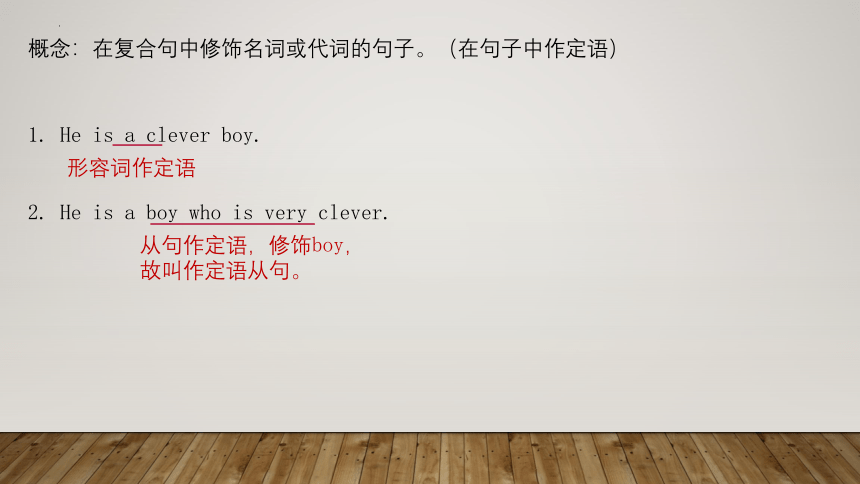
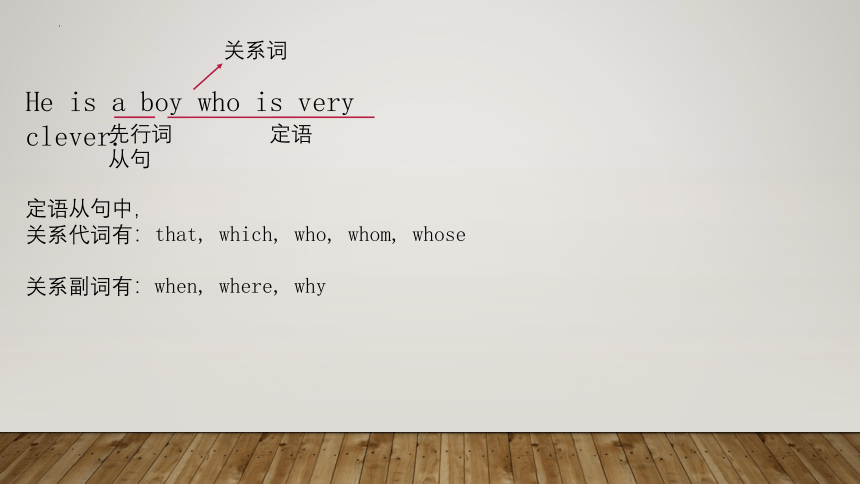
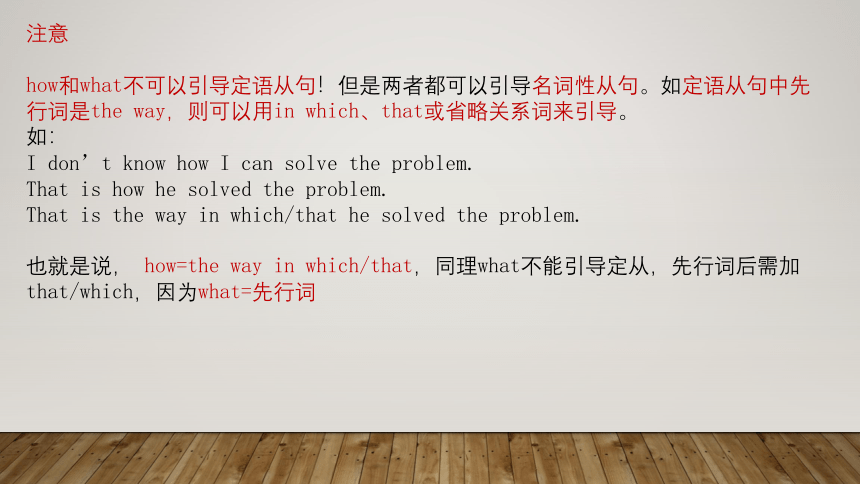
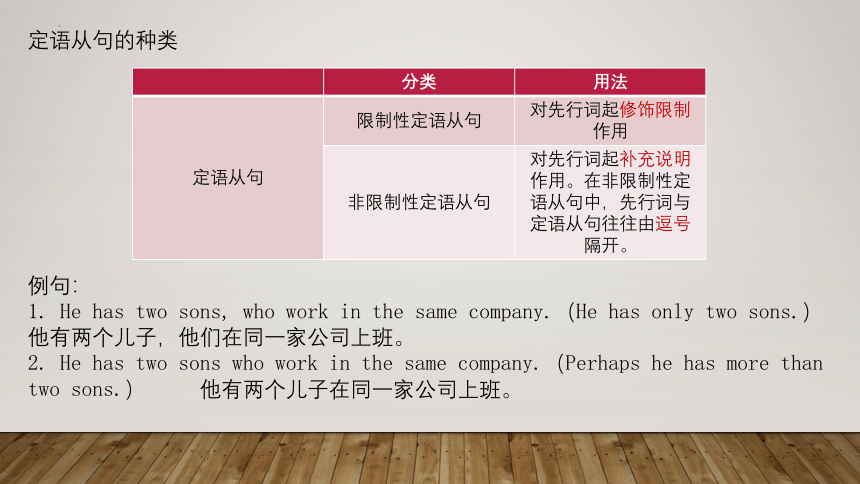
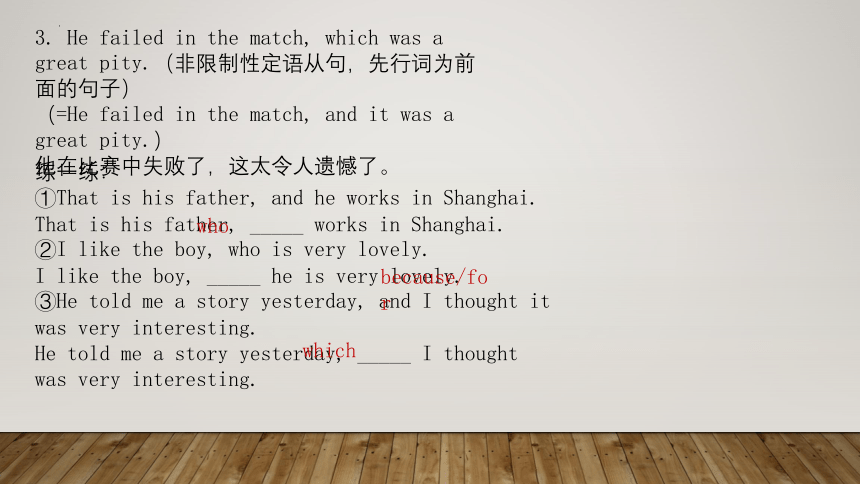
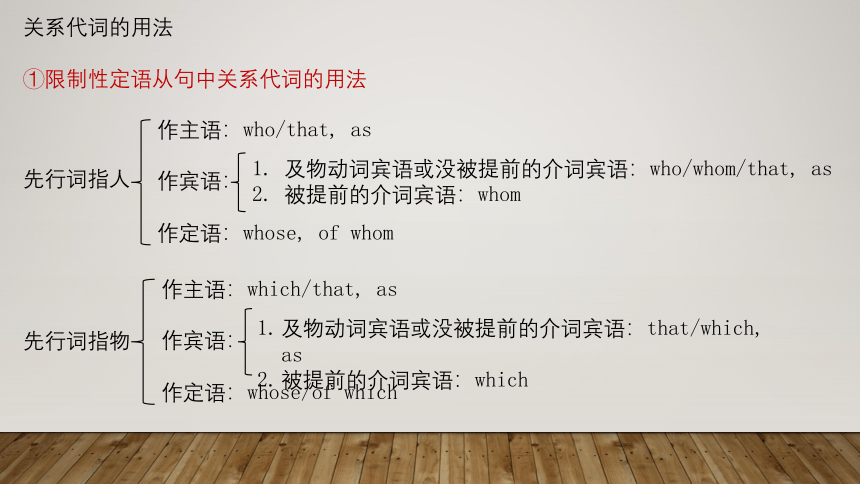
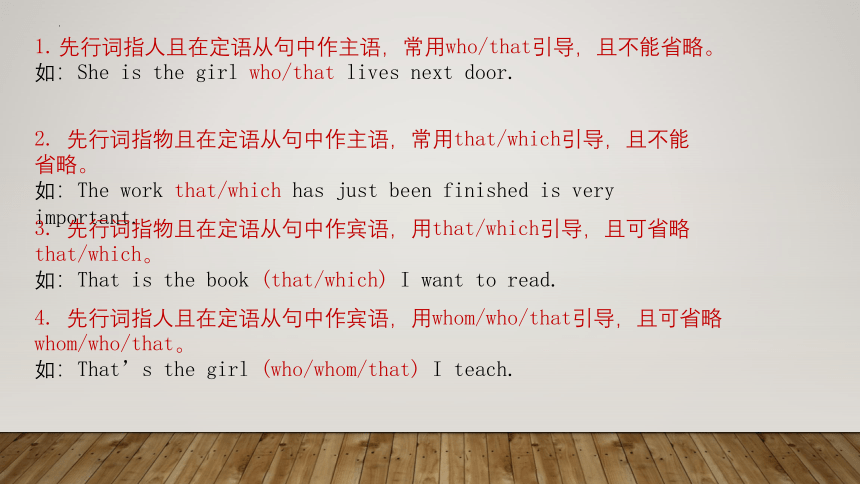
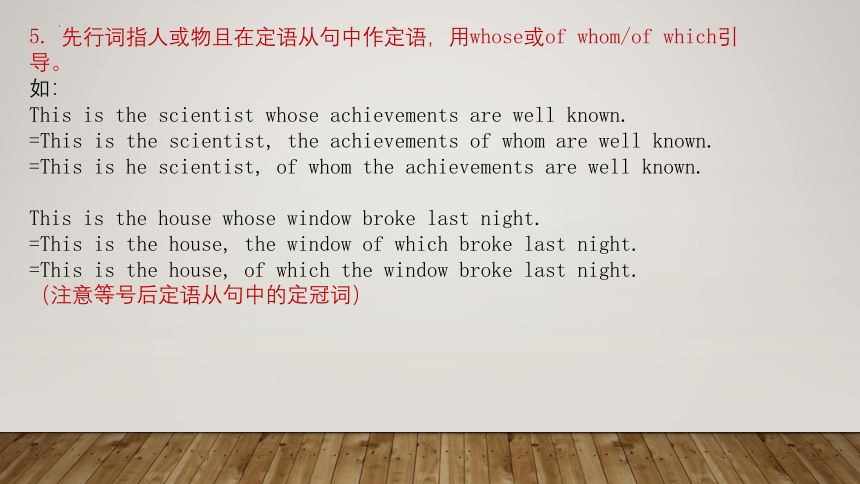
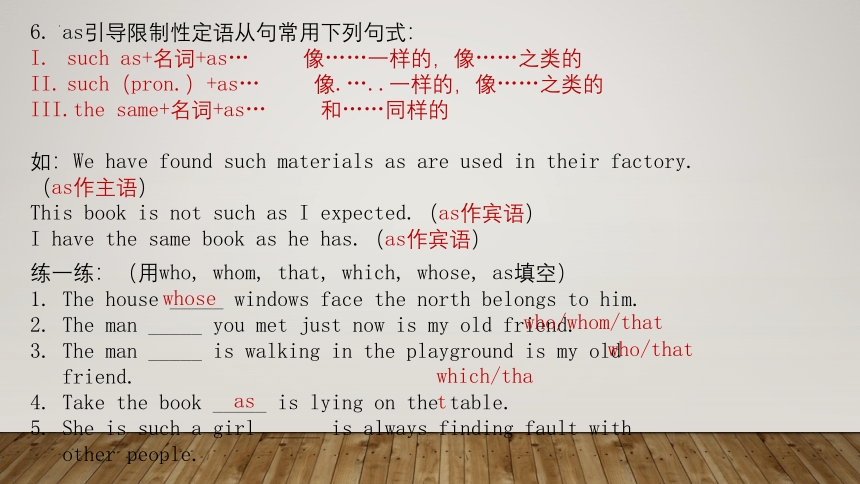
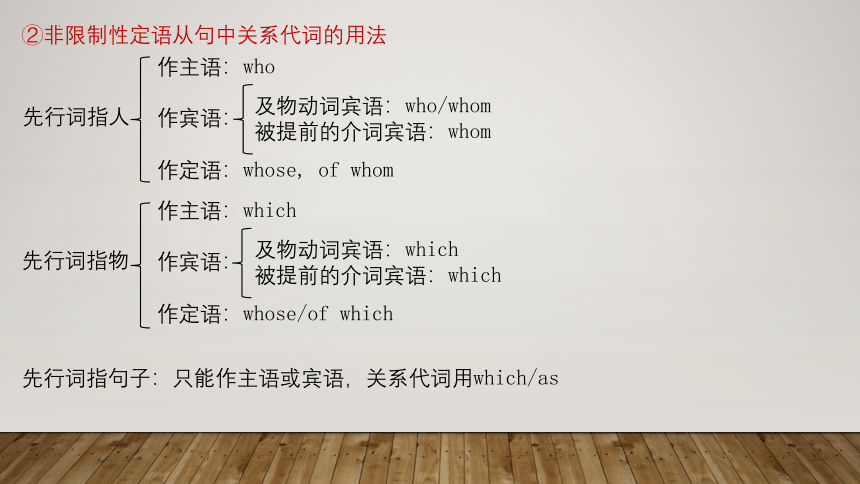
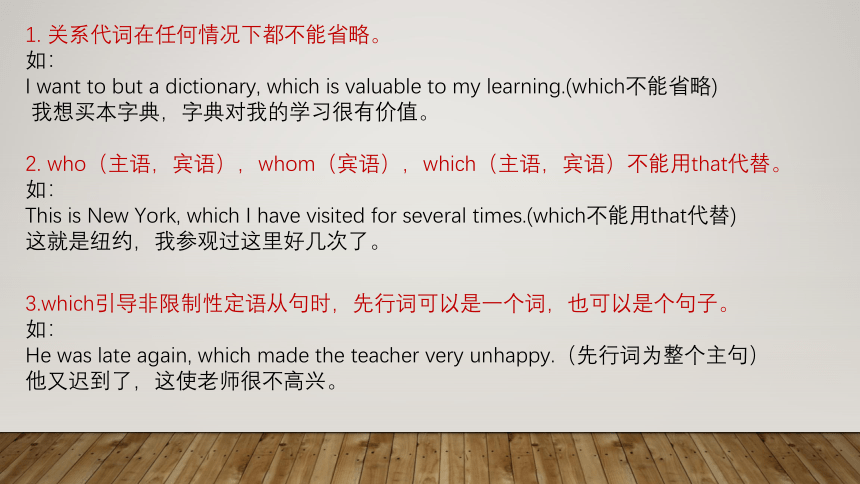
文档简介
(共30张PPT)
定语从句
the attributive clause
概念:在复合句中修饰名词或代词的句子。(在句子中作定语)
1. He is a clever boy.
2. He is a boy who is very clever.
形容词作定语
从句作定语,修饰boy,故叫作定语从句。
He is a boy who is very clever.
先行词 定语从句
关系词
定语从句中,
关系代词有:that, which, who, whom, whose
关系副词有:when, where, why
注意
how和what不可以引导定语从句!但是两者都可以引导名词性从句。如定语从句中先行词是the way,则可以用in which、that或省略关系词来引导。
如:
I don’t know how I can solve the problem.
That is how he solved the problem.
That is the way in which/that he solved the problem.
也就是说, how=the way in which/that,同理what不能引导定从,先行词后需加that/which,因为what=先行词
定语从句的种类
分类 用法
定语从句 限制性定语从句 对先行词起修饰限制作用
非限制性定语从句 对先行词起补充说明作用。在非限制性定语从句中,先行词与定语从句往往由逗号隔开。
例句:
1. He has two sons, who work in the same company.(He has only two sons.)
他有两个儿子,他们在同一家公司上班。
2. He has two sons who work in the same company.(Perhaps he has more than two sons.) 他有两个儿子在同一家公司上班。
3. He failed in the match, which was a great pity.(非限制性定语从句,先行词为前面的句子)
(=He failed in the match, and it was a great pity.)
他在比赛中失败了,这太令人遗憾了。
练一练:
①That is his father, and he works in Shanghai.
That is his father, _____ works in Shanghai.
②I like the boy, who is very lovely.
I like the boy, _____ he is very lovely.
③He told me a story yesterday, and I thought it was very interesting.
He told me a story yesterday, _____ I thought was very interesting.
who
because/for
which
关系代词的用法
①限制性定语从句中关系代词的用法
先行词指人
作主语:who/that, as
作宾语:
作定语:whose, of whom
及物动词宾语或没被提前的介词宾语:who/whom/that, as
被提前的介词宾语:whom
先行词指物
作主语:which/that, as
作宾语:
作定语:whose/of which
及物动词宾语或没被提前的介词宾语:that/which, as
被提前的介词宾语:which
先行词指人且在定语从句中作主语,常用who/that引导,且不能省略。
如:She is the girl who/that lives next door.
2. 先行词指物且在定语从句中作主语,常用that/which引导,且不能省略。
如:The work that/which has just been finished is very important.
3. 先行词指物且在定语从句中作宾语,用that/which引导,且可省略that/which。
如:That is the book (that/which) I want to read.
4. 先行词指人且在定语从句中作宾语,用whom/who/that引导,且可省略whom/who/that。
如:That’s the girl (who/whom/that) I teach.
5. 先行词指人或物且在定语从句中作定语,用whose或of whom/of which引导。
如:
This is the scientist whose achievements are well known.
=This is the scientist, the achievements of whom are well known.
=This is he scientist, of whom the achievements are well known.
This is the house whose window broke last night.
=This is the house, the window of which broke last night.
=This is the house, of which the window broke last night.
(注意等号后定语从句中的定冠词)
6. as引导限制性定语从句常用下列句式:
such as+名词+as… 像……一样的,像……之类的
such(pron.)+as… 像.…..一样的,像……之类的
the same+名词+as… 和……同样的
如:We have found such materials as are used in their factory.(as作主语)
This book is not such as I expected.(as作宾语)
I have the same book as he has.(as作宾语)
练一练:(用who, whom, that, which, whose, as填空)
The house _____ windows face the north belongs to him.
The man _____ you met just now is my old friend.
The man _____ is walking in the playground is my old friend.
Take the book _____ is lying on the table.
She is such a girl _____ is always finding fault with other people.
whose
who/whom/that
who/that
which/that
as
②非限制性定语从句中关系代词的用法
先行词指人
先行词指物
作主语:who
作宾语:
作定语:whose, of whom
作主语:which
作宾语:
作定语:whose/of which
及物动词宾语:who/whom
被提前的介词宾语:whom
及物动词宾语:which
被提前的介词宾语:which
先行词指句子:只能作主语或宾语,关系代词用which/as
1. 关系代词在任何情况下都不能省略。
如:
I want to but a dictionary, which is valuable to my learning.(which不能省略)
我想买本字典,字典对我的学习很有价值。
2. who(主语,宾语),whom(宾语),which(主语,宾语)不能用that代替。
如:
This is New York, which I have visited for several times.(which不能用that代替)
这就是纽约,我参观过这里好几次了。
3.which引导非限制性定语从句时,先行词可以是一个词,也可以是个句子。
如:
He was late again, which made the teacher very unhappy.(先行词为整个主句)
他又迟到了,这使老师很不高兴。
4.关系代词as也可以引导非限制性定语从句,先行词为句子,as在从句中作主语、宾语等。
如:
As we know, China is a developing country.
我们知道,中国是个发展中国家。
As is known to us all, China is in the east of Asia.
众所周知,中国在亚洲的东部。
③关系代词除上面的基本用法外,还有下列特殊用法:
1.有时为了使表达的意思更清楚,用:“which+名词”引导定语从句。
He advised me to hide behind the door, which advice I took at once.他建议我躲在门后,我立即照着做了。
2.“介词+关系代词”引导的定语从句
(1)当介词放在关系代词的前面时,关系代词常用which或whom,并且不能省略。
He paid the boy $10 for washing ten windows, most of which hadn't been cleaned for at least a year.
他付给男孩10美元擦洗10扇窗户,这10扇窗户中大部分至少一年没擦了。
In the dark street, there wasn't a person, to whom she could turn for help.
在黑暗的街道上一个人也没有,她没有人可以求助。
(2)在限制性定语从句中,当介词位于定语从句的末尾时,可用that/which(指物),that/whom/who(指人)作介词的宾语,而且作介词宾语的关系代词可以省略。
This is the hero that/who/whom(可省略)we are proud of.
这是我们引以为荣的那个英雄。
This is the pen that/which(可省略)I wrote the letter with.
这是我写信时用的那支钢笔。
(3)在非限制性定语从句中,“介词+which/whom”中的介词不能移到从句的后面。
He has visited Gu'an No.One High School for several times,in which he has many friends.(in不能放在定语从句句末)
他已经参观固安一中几次了,在那里他有很多朋友。
(4)“复合介词短语+关系代词which”引导的定语从句常与先行词用逗号分开,定语从句常用倒装语序。
He lived in a big house, in front of which stood a big tall tree.
他住在一所大房子里,房子前面有一颗又大又高的树。
(5)“介词+which/whom+不定式”结构。
The poor man has no house in which to live.
=The poor man has no house(that/which)he can live in.
=The poor man has no house in which he can live.
=The poor man has no house to live in.
那个穷人没房子住。
题组训练
1. He may win the competition, in ______ case he is likely to get into the national team.
2. Frank's dream is to have his own garden in ______ to produce many beautiful flowers.
which
which
关系词的辨析
1.关系代词that和which的区别
(1)在限制性定语从句中,用关系代词that不用which的情况:
情况 例句
当先行词是不定代词all, little, few, much, everything, anything, nothing, none, some等时 Do you have anything that you want to say for yourself
当先行词被the only, the very(恰恰,正好),any, every, no, all, few, little, much, the right, the last, just等词修饰时 This is the very bus that I’m waiting for.
当先行词是形容词最高级或先行词的前面有形容词最高级修饰时 This is the best way that has been used against pollution.
当先行词是序数词或它前面有序数词修饰时 This train is the first that will go to Suzhou.
当先行词既有人又有物时 Do you know the persons and things that they are talking about
当主句的主语是疑问词who或which时 Which is the bike that you lost
有两个定语从句时,其中一个关系代词宜用which,另外一个宜用that They secretly built up a small factory, which produced things that could cause pollution.
当先行词在主句中作表语,而关系代词在从句中也作表语时 Shanghai is no longer the city that it used to be.
主句是there be句型且关系词在从句中作主语时,用that不用which引导 There is a seat in the corner that is still available.
(2)当先行词指事/物时,定语从句中关系代词用which不用that的情况:
情况 例句
在非限制性定语从句中,只用which,不用that The sports meeting was put off, which astonished me.
当动词短语中的介词提前时,只用which,不用that。注意:在一些固定搭配的动词短语中,由于动词和介词不可分割,因此不能把介词置于关系代词之前 This is the house in which Lu Xun once lived.
(√)This is the pen (which/that)I’m looking for.
(×)This is the pen for which I’m looking.
先行词后面有插入语时,只用which,不用that Here is the English grammar book which, as I’ve told you, will help you improve your English.
先行词本身就是that时,只用which,不用that What’s that which flashed through the sky just now
用关系代词that或which填空
I refuse to accept the blame for something _____ was someone else’s fault.
Whenever I met her, _____ was fairly often, she greeted me with a sweet smile.
All the presents _____ your friends gave you on your birthday should be put away.
This is the very book _____ I have been looking for.
He was late for the opening ceremony, _____ was very surprising to me.
that
that
that
which
which
关系代词as和which
as和which都可以引导非限制性定语从句,先行词为整个主句或主句中的一部分内容,先行词在定语从句中作主语、宾语或表语,as和which均不可省略,有时两者可以互换。
如:He married her, as/which was natural.
下列情况通常只用as不用which:
①当定语从句置于主句前面时,用as不用which。
As you see, the Chinese people are hard-working.
注意下面句子的多种表达方法:
1. As is known to everybody, the moon travels round the earth once every month.
2. It is known to everybody that the moon travels round the earth once every month.
3. What is known to everybody is that the moon travels round the earth once every month.
②先行词作主语且定语从句使用被动语态时,通常用as不用which,从句谓语通常为:be known, be said, be reported, be announced, be mentioned等。如果从句是主动语态,一般用which作主语。
如:
She has been absent again, as is expected.
Tom has made rapid progress, which makes me very happy.
另外,as常用在下列习惯用语中:as(it)seems likely, as(it)often happens, as(it)was pointed out…
如:Jack has won the first prize, as it often happens.
用法 例句
关系代词代替前面主句中的宾语从句或定语从句的谓语动词后有复合宾语时 I don’t think that he will come to see me, which makes me sad.
主句和从句之间存在着逻辑上的因果关系 Tom was late for school again and again, which made his teacher very angry.
当非限制性定语从句是否定句时 He pretended not to know me, which I didn’t understand.
非限制性定语从句中的be动词不能省略时,用which;反之用as Jane told me she won the match, which was a lie.(was不可省略)
As(was)planned, we met at the airport.(was可省略)
下列情况通常用which而不用as:
例题:
A lot of language learning, _____ has been discovered, is happening in the first year of life, so parents should talk much to their children during that period.
There is no simple answer, _____ is often the case in science.
as
as
关系副词的用法
(一)当关系词在定语从句中作状语时,要用关系副词。其中when=表时间的介词(如:in, at, on ,during等)+which;where=表地点的介词(如:in, at, on, under等)+which;why=表原因的介词(如:for)+which。
如:
I can still remember the day when I first came to Beijing.(when=on which)
Can you tell me the office where he works (where=in which)
Do you know the reason why he is absent (why=for which)
此外,当先行词为situation, case, stage, point等,且关系词在定语从句中作状语时,也要用关系副词where引导。
如:They have reached the point where they have to separate with each other.
例题:
He wrote a letter _____ he explained what had happened in the accident.
Sales director is a position _____ communication ability is just as important as sales skills.
(二)where/when=介词+关系代词(which),有时为了表达清楚,还可以在关系副词where/when前加介词from/to等。
如:
China is the birthplace of kites, from where kite flying spreads to Japan, Thailand, India and so on.
(三)关系副词when, where可用于非限制性定语从句中,而关系副词why不可以。
where
where
注意way和time后接定语从句的情况
1. 当先行词是way(意为“方式,方法”)时,引导定语从句的关系词有下列三种形式。
What surprised me was not what he said but the way(in which/that/不填)he said it.
让我吃惊的不是他说的话,而是他说话的方式。
注意下面两个句子中关系词的不同,试比较:
The way(that/which/不填)he explained to us was quite simple.
他向我们解释的那种方法很简单。
2. The way(that/in which/不填)he explained the sentence to us was not difficult to understand.
他向我们解释句子的那种方式不难理解。
2. 先行词是time,若time作“次数”讲,应用关系代词that引导定语从句,that可省略;若time作“一段时间”讲且作状语,应用关系副词when或“介词at/during+which”引导定语从句。
如:
This is the second time(that)the President has visited the country.
This was at a time when/during which there were no radios, no telephones or no TV sets.
填一填
I don’t like the way _____ he laughs at her.
This is the second time ______ I have been here.
Can you still remember the time _____ we spent together in our childhood
that/in which
that
that/which
定语从句中关系代词和关系副词的比较
引导定语从句的关系代词和关系副词除了起连接主句和从句的作用以外,它们还有一个最重要的作用,那就是它们分别在定语从句中作成分。具体地说,关系代词在定语从句中作主语、宾语、定语或表语,而关系副词在定语从句中作状语。因此,在选择关系词时,最重要的是分析一下定语从句中所缺的成分,若从句中缺主语、宾语、定语或表语,那么需用关系代词;若从句中缺状语,那么需用关系副词。
试比较下面的句子:
(1)Do you still remember the days(that/which)we spent in Qingdao
(2)Do you still remember the days when we spent the summer holidays in Qingdao
在句(1)中,定语从句缺宾语,因此可用关系代词that/which来引导从句,也可省略;在句(2)中,定语从句中缺时间状语,因此需用关系副词when来引导从句。
练一练:(用that, when, why, where, which填空)
I want to know the date _____ you were born.
I have forgotten the date _____ you told me.
Do you know the reason _____ he is absent today
That is the reason _____ I want to know.
Many countries are now setting up national parks _____ animals and plants can be protected.
This is the factory _____ his father built.
when
that/which
why
that/which
where
that/which
定语从句
the attributive clause
概念:在复合句中修饰名词或代词的句子。(在句子中作定语)
1. He is a clever boy.
2. He is a boy who is very clever.
形容词作定语
从句作定语,修饰boy,故叫作定语从句。
He is a boy who is very clever.
先行词 定语从句
关系词
定语从句中,
关系代词有:that, which, who, whom, whose
关系副词有:when, where, why
注意
how和what不可以引导定语从句!但是两者都可以引导名词性从句。如定语从句中先行词是the way,则可以用in which、that或省略关系词来引导。
如:
I don’t know how I can solve the problem.
That is how he solved the problem.
That is the way in which/that he solved the problem.
也就是说, how=the way in which/that,同理what不能引导定从,先行词后需加that/which,因为what=先行词
定语从句的种类
分类 用法
定语从句 限制性定语从句 对先行词起修饰限制作用
非限制性定语从句 对先行词起补充说明作用。在非限制性定语从句中,先行词与定语从句往往由逗号隔开。
例句:
1. He has two sons, who work in the same company.(He has only two sons.)
他有两个儿子,他们在同一家公司上班。
2. He has two sons who work in the same company.(Perhaps he has more than two sons.) 他有两个儿子在同一家公司上班。
3. He failed in the match, which was a great pity.(非限制性定语从句,先行词为前面的句子)
(=He failed in the match, and it was a great pity.)
他在比赛中失败了,这太令人遗憾了。
练一练:
①That is his father, and he works in Shanghai.
That is his father, _____ works in Shanghai.
②I like the boy, who is very lovely.
I like the boy, _____ he is very lovely.
③He told me a story yesterday, and I thought it was very interesting.
He told me a story yesterday, _____ I thought was very interesting.
who
because/for
which
关系代词的用法
①限制性定语从句中关系代词的用法
先行词指人
作主语:who/that, as
作宾语:
作定语:whose, of whom
及物动词宾语或没被提前的介词宾语:who/whom/that, as
被提前的介词宾语:whom
先行词指物
作主语:which/that, as
作宾语:
作定语:whose/of which
及物动词宾语或没被提前的介词宾语:that/which, as
被提前的介词宾语:which
先行词指人且在定语从句中作主语,常用who/that引导,且不能省略。
如:She is the girl who/that lives next door.
2. 先行词指物且在定语从句中作主语,常用that/which引导,且不能省略。
如:The work that/which has just been finished is very important.
3. 先行词指物且在定语从句中作宾语,用that/which引导,且可省略that/which。
如:That is the book (that/which) I want to read.
4. 先行词指人且在定语从句中作宾语,用whom/who/that引导,且可省略whom/who/that。
如:That’s the girl (who/whom/that) I teach.
5. 先行词指人或物且在定语从句中作定语,用whose或of whom/of which引导。
如:
This is the scientist whose achievements are well known.
=This is the scientist, the achievements of whom are well known.
=This is he scientist, of whom the achievements are well known.
This is the house whose window broke last night.
=This is the house, the window of which broke last night.
=This is the house, of which the window broke last night.
(注意等号后定语从句中的定冠词)
6. as引导限制性定语从句常用下列句式:
such as+名词+as… 像……一样的,像……之类的
such(pron.)+as… 像.…..一样的,像……之类的
the same+名词+as… 和……同样的
如:We have found such materials as are used in their factory.(as作主语)
This book is not such as I expected.(as作宾语)
I have the same book as he has.(as作宾语)
练一练:(用who, whom, that, which, whose, as填空)
The house _____ windows face the north belongs to him.
The man _____ you met just now is my old friend.
The man _____ is walking in the playground is my old friend.
Take the book _____ is lying on the table.
She is such a girl _____ is always finding fault with other people.
whose
who/whom/that
who/that
which/that
as
②非限制性定语从句中关系代词的用法
先行词指人
先行词指物
作主语:who
作宾语:
作定语:whose, of whom
作主语:which
作宾语:
作定语:whose/of which
及物动词宾语:who/whom
被提前的介词宾语:whom
及物动词宾语:which
被提前的介词宾语:which
先行词指句子:只能作主语或宾语,关系代词用which/as
1. 关系代词在任何情况下都不能省略。
如:
I want to but a dictionary, which is valuable to my learning.(which不能省略)
我想买本字典,字典对我的学习很有价值。
2. who(主语,宾语),whom(宾语),which(主语,宾语)不能用that代替。
如:
This is New York, which I have visited for several times.(which不能用that代替)
这就是纽约,我参观过这里好几次了。
3.which引导非限制性定语从句时,先行词可以是一个词,也可以是个句子。
如:
He was late again, which made the teacher very unhappy.(先行词为整个主句)
他又迟到了,这使老师很不高兴。
4.关系代词as也可以引导非限制性定语从句,先行词为句子,as在从句中作主语、宾语等。
如:
As we know, China is a developing country.
我们知道,中国是个发展中国家。
As is known to us all, China is in the east of Asia.
众所周知,中国在亚洲的东部。
③关系代词除上面的基本用法外,还有下列特殊用法:
1.有时为了使表达的意思更清楚,用:“which+名词”引导定语从句。
He advised me to hide behind the door, which advice I took at once.他建议我躲在门后,我立即照着做了。
2.“介词+关系代词”引导的定语从句
(1)当介词放在关系代词的前面时,关系代词常用which或whom,并且不能省略。
He paid the boy $10 for washing ten windows, most of which hadn't been cleaned for at least a year.
他付给男孩10美元擦洗10扇窗户,这10扇窗户中大部分至少一年没擦了。
In the dark street, there wasn't a person, to whom she could turn for help.
在黑暗的街道上一个人也没有,她没有人可以求助。
(2)在限制性定语从句中,当介词位于定语从句的末尾时,可用that/which(指物),that/whom/who(指人)作介词的宾语,而且作介词宾语的关系代词可以省略。
This is the hero that/who/whom(可省略)we are proud of.
这是我们引以为荣的那个英雄。
This is the pen that/which(可省略)I wrote the letter with.
这是我写信时用的那支钢笔。
(3)在非限制性定语从句中,“介词+which/whom”中的介词不能移到从句的后面。
He has visited Gu'an No.One High School for several times,in which he has many friends.(in不能放在定语从句句末)
他已经参观固安一中几次了,在那里他有很多朋友。
(4)“复合介词短语+关系代词which”引导的定语从句常与先行词用逗号分开,定语从句常用倒装语序。
He lived in a big house, in front of which stood a big tall tree.
他住在一所大房子里,房子前面有一颗又大又高的树。
(5)“介词+which/whom+不定式”结构。
The poor man has no house in which to live.
=The poor man has no house(that/which)he can live in.
=The poor man has no house in which he can live.
=The poor man has no house to live in.
那个穷人没房子住。
题组训练
1. He may win the competition, in ______ case he is likely to get into the national team.
2. Frank's dream is to have his own garden in ______ to produce many beautiful flowers.
which
which
关系词的辨析
1.关系代词that和which的区别
(1)在限制性定语从句中,用关系代词that不用which的情况:
情况 例句
当先行词是不定代词all, little, few, much, everything, anything, nothing, none, some等时 Do you have anything that you want to say for yourself
当先行词被the only, the very(恰恰,正好),any, every, no, all, few, little, much, the right, the last, just等词修饰时 This is the very bus that I’m waiting for.
当先行词是形容词最高级或先行词的前面有形容词最高级修饰时 This is the best way that has been used against pollution.
当先行词是序数词或它前面有序数词修饰时 This train is the first that will go to Suzhou.
当先行词既有人又有物时 Do you know the persons and things that they are talking about
当主句的主语是疑问词who或which时 Which is the bike that you lost
有两个定语从句时,其中一个关系代词宜用which,另外一个宜用that They secretly built up a small factory, which produced things that could cause pollution.
当先行词在主句中作表语,而关系代词在从句中也作表语时 Shanghai is no longer the city that it used to be.
主句是there be句型且关系词在从句中作主语时,用that不用which引导 There is a seat in the corner that is still available.
(2)当先行词指事/物时,定语从句中关系代词用which不用that的情况:
情况 例句
在非限制性定语从句中,只用which,不用that The sports meeting was put off, which astonished me.
当动词短语中的介词提前时,只用which,不用that。注意:在一些固定搭配的动词短语中,由于动词和介词不可分割,因此不能把介词置于关系代词之前 This is the house in which Lu Xun once lived.
(√)This is the pen (which/that)I’m looking for.
(×)This is the pen for which I’m looking.
先行词后面有插入语时,只用which,不用that Here is the English grammar book which, as I’ve told you, will help you improve your English.
先行词本身就是that时,只用which,不用that What’s that which flashed through the sky just now
用关系代词that或which填空
I refuse to accept the blame for something _____ was someone else’s fault.
Whenever I met her, _____ was fairly often, she greeted me with a sweet smile.
All the presents _____ your friends gave you on your birthday should be put away.
This is the very book _____ I have been looking for.
He was late for the opening ceremony, _____ was very surprising to me.
that
that
that
which
which
关系代词as和which
as和which都可以引导非限制性定语从句,先行词为整个主句或主句中的一部分内容,先行词在定语从句中作主语、宾语或表语,as和which均不可省略,有时两者可以互换。
如:He married her, as/which was natural.
下列情况通常只用as不用which:
①当定语从句置于主句前面时,用as不用which。
As you see, the Chinese people are hard-working.
注意下面句子的多种表达方法:
1. As is known to everybody, the moon travels round the earth once every month.
2. It is known to everybody that the moon travels round the earth once every month.
3. What is known to everybody is that the moon travels round the earth once every month.
②先行词作主语且定语从句使用被动语态时,通常用as不用which,从句谓语通常为:be known, be said, be reported, be announced, be mentioned等。如果从句是主动语态,一般用which作主语。
如:
She has been absent again, as is expected.
Tom has made rapid progress, which makes me very happy.
另外,as常用在下列习惯用语中:as(it)seems likely, as(it)often happens, as(it)was pointed out…
如:Jack has won the first prize, as it often happens.
用法 例句
关系代词代替前面主句中的宾语从句或定语从句的谓语动词后有复合宾语时 I don’t think that he will come to see me, which makes me sad.
主句和从句之间存在着逻辑上的因果关系 Tom was late for school again and again, which made his teacher very angry.
当非限制性定语从句是否定句时 He pretended not to know me, which I didn’t understand.
非限制性定语从句中的be动词不能省略时,用which;反之用as Jane told me she won the match, which was a lie.(was不可省略)
As(was)planned, we met at the airport.(was可省略)
下列情况通常用which而不用as:
例题:
A lot of language learning, _____ has been discovered, is happening in the first year of life, so parents should talk much to their children during that period.
There is no simple answer, _____ is often the case in science.
as
as
关系副词的用法
(一)当关系词在定语从句中作状语时,要用关系副词。其中when=表时间的介词(如:in, at, on ,during等)+which;where=表地点的介词(如:in, at, on, under等)+which;why=表原因的介词(如:for)+which。
如:
I can still remember the day when I first came to Beijing.(when=on which)
Can you tell me the office where he works (where=in which)
Do you know the reason why he is absent (why=for which)
此外,当先行词为situation, case, stage, point等,且关系词在定语从句中作状语时,也要用关系副词where引导。
如:They have reached the point where they have to separate with each other.
例题:
He wrote a letter _____ he explained what had happened in the accident.
Sales director is a position _____ communication ability is just as important as sales skills.
(二)where/when=介词+关系代词(which),有时为了表达清楚,还可以在关系副词where/when前加介词from/to等。
如:
China is the birthplace of kites, from where kite flying spreads to Japan, Thailand, India and so on.
(三)关系副词when, where可用于非限制性定语从句中,而关系副词why不可以。
where
where
注意way和time后接定语从句的情况
1. 当先行词是way(意为“方式,方法”)时,引导定语从句的关系词有下列三种形式。
What surprised me was not what he said but the way(in which/that/不填)he said it.
让我吃惊的不是他说的话,而是他说话的方式。
注意下面两个句子中关系词的不同,试比较:
The way(that/which/不填)he explained to us was quite simple.
他向我们解释的那种方法很简单。
2. The way(that/in which/不填)he explained the sentence to us was not difficult to understand.
他向我们解释句子的那种方式不难理解。
2. 先行词是time,若time作“次数”讲,应用关系代词that引导定语从句,that可省略;若time作“一段时间”讲且作状语,应用关系副词when或“介词at/during+which”引导定语从句。
如:
This is the second time(that)the President has visited the country.
This was at a time when/during which there were no radios, no telephones or no TV sets.
填一填
I don’t like the way _____ he laughs at her.
This is the second time ______ I have been here.
Can you still remember the time _____ we spent together in our childhood
that/in which
that
that/which
定语从句中关系代词和关系副词的比较
引导定语从句的关系代词和关系副词除了起连接主句和从句的作用以外,它们还有一个最重要的作用,那就是它们分别在定语从句中作成分。具体地说,关系代词在定语从句中作主语、宾语、定语或表语,而关系副词在定语从句中作状语。因此,在选择关系词时,最重要的是分析一下定语从句中所缺的成分,若从句中缺主语、宾语、定语或表语,那么需用关系代词;若从句中缺状语,那么需用关系副词。
试比较下面的句子:
(1)Do you still remember the days(that/which)we spent in Qingdao
(2)Do you still remember the days when we spent the summer holidays in Qingdao
在句(1)中,定语从句缺宾语,因此可用关系代词that/which来引导从句,也可省略;在句(2)中,定语从句中缺时间状语,因此需用关系副词when来引导从句。
练一练:(用that, when, why, where, which填空)
I want to know the date _____ you were born.
I have forgotten the date _____ you told me.
Do you know the reason _____ he is absent today
That is the reason _____ I want to know.
Many countries are now setting up national parks _____ animals and plants can be protected.
This is the factory _____ his father built.
when
that/which
why
that/which
where
that/which
